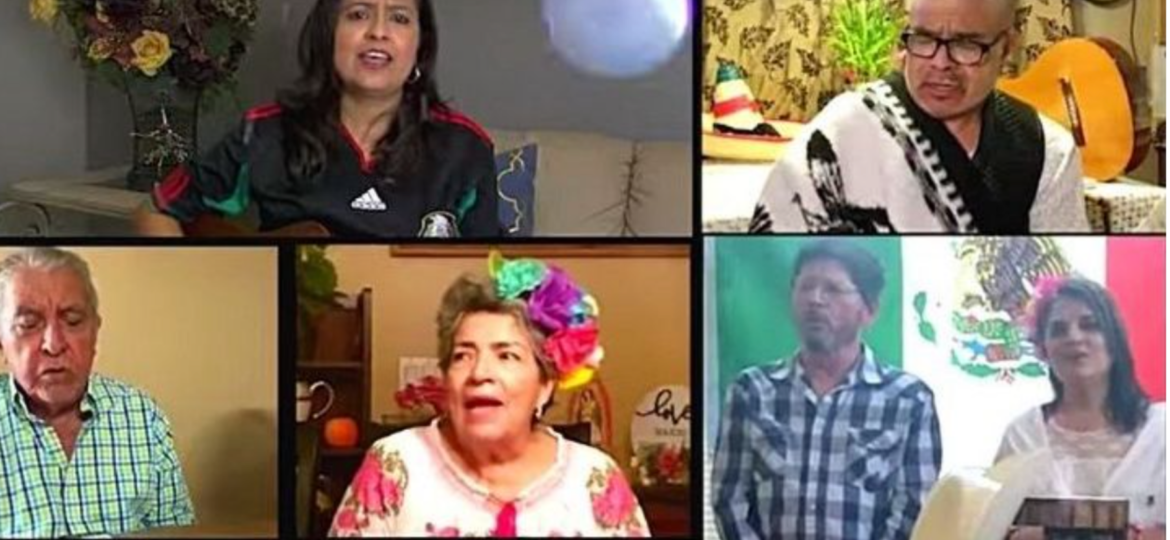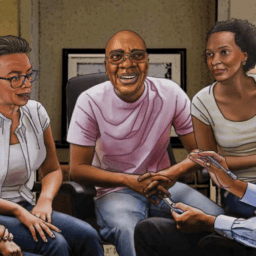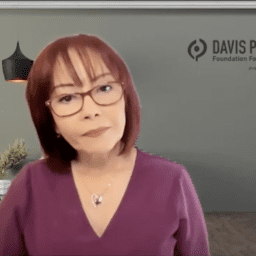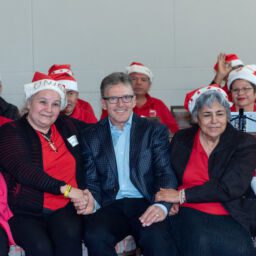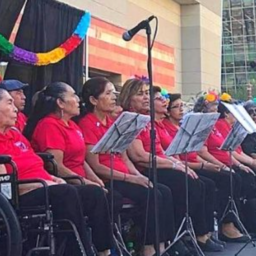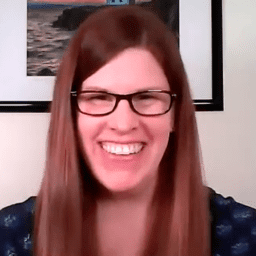Lea esta relato en español aquí.
“Music is such a bright aspect of culture. It’s a way to communicate. To celebrate. To express your culture. It’s part of who we are.”
With this sentiment in mind, Dr. Claudia Martinez, MD, set out in 2007 to build a program that would not only help Hispanics living with Parkinson’s communicate and celebrate but strengthen their voices and empower them as well. Today, with almost 40 active members, 12 events each year, and a bond that has made them a family, the choir—Voces Unidas—does all that and more.
United Voices Come Together
“‘Voces Unidas’ translates to ‘united voices,'” Dr. Martinez says. “It means that what makes us strong is that we’re together.”
Dr. Martinez, the Hispanic Outreach Coordinator at the Barrow Neurological Institute’s Muhammad Ali Parkinson Center, was inspired by this power of connection to create the Choir Voces Unidas. She knows how Parkinson’s can impact a person’s speech and voice, and she knew that a meaningful way to regain lost communication skills was through music.
She also knew that because of barriers in her Phoenix, Arizona, community meant many people living with Parkinson’s had few formal ways to practice these skills.
“There are national choir groups all over the country for people with Parkinson’s, programs to help members with speech and voice practice. When I started here in 2007, I asked if there were any programs like these for Spanish speakers, and the answer was no.”
-Dr. Claudia Martinez, MD
So, she created one.
Knowing the choir needed a director experienced in music and also diverse communities and cultures, Dr. Martinez approached a Peruvian musician she knew. “He didn’t know about Parkinson’s, but when he attended an event put together by the MAPC Hispanic outreach program, he decided to join because of its values, energy, and positive impact on the community.”
The choir’s first members, which formally began in 2009, had already been part of Comadres/Compadres, the Parkinson’s support groups in Spanish at the Muhammad Ali Parkinson Center. Still, few had had experience singing in a group. “I always liked singing,” says Voces Unidas member Patricia, “but I think I don’t sing well at all, so no one had ever invited me to be part of a choir. And when they invited me to Voces Unidas, I thought, ‘Oh my god, finally! I don’t know that they’re going to keep me, but at least they invited me!’ And now I am pleased that they wanted to keep me.”
Opening Doors
Choir member Carlos Rivera felt encouraged to join because it gave him “a different tool for improving his quality of life with Parkinson’s, other than medicine and a trip to the doctor.” Fellow participants Heriberto Negrete and José Portillo were drawn to the program by the positive impacts of singing on their voices, and they welcomed access to the training.
“When the choir started, our community didn’t have any speech-language therapists who were trained in Parkinson’s and spoke Spanish,” Dr. Martinez says. “That was a challenge. So having the choir as a way for people to strengthen their voice—without their having to speak English—was wonderful.”
Another barrier for many people with Parkinson’s in Dr. Martinez’s community was insurance. “If you don’t have insurance, you don’t have an opportunity to see a speech-therapist. The choir gives them this advantage, and that’s something the members welcomed.”
Connect the Community
While the choir members agree that participating does improve their voices and communication, they find that other benefits are even more valuable.
“The sense of camaraderie drew several people to the choir,” Dr. Martinez says. “Because they’d been in our support groups, many of them already felt like they were part of a family. Now, this feeling is even stronger. They’re a tight group. They love and care about each other. If someone misses a class, others call to check on them. It’s a safe space; there’s no judgment. Everyone is totally supportive. They get together to give their best—the choir is the best of each one of them.”
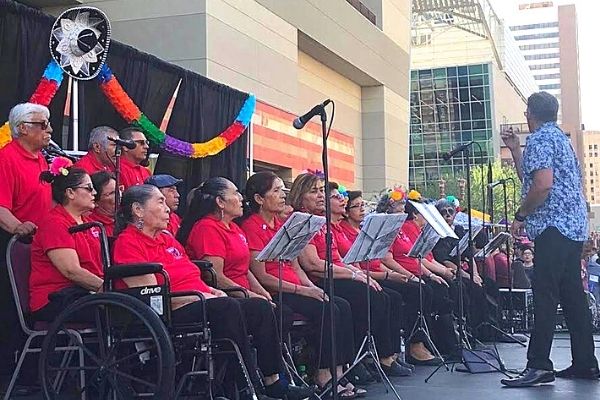
Being part of such a group has been both empowering and transformative for the members.
“Some of them were feeling isolated, like many people with Parkinson’s feel. They felt shame, and they had low self-esteem. Then, being in the choir, they turned into advocates for themselves and Parkinson’s at large.”
Aida Olivo, a care partner who is also one of MAPC’s promotoras (community health worker), sees this as the choir’s greatest strength. “It has such a positive impact on people who are dealing with shame or acceptance issues,” she says.
Jorge Lopez, the only member from Guatemala when he joined Voces Unidas, is a shining example of the transformation that many members experienced.
“He was pretty isolated when he first heard of our group,” Dr. Martinez says. “But as he got to know our promotoras and learned how he could live well with Parkinson’s, he took the invitation and joined the group. And he then became a great advocate and now is one of the most forward people in Voces Unidas.”
Jorge said that although he was the only Guatemalan in the group, he knew he wasn’t the only Guatemalan in the community living with Parkinson’s. There were probably many people from Guatemala who didn’t know about Parkinson’s, who didn’t know they had Parkinson’s.
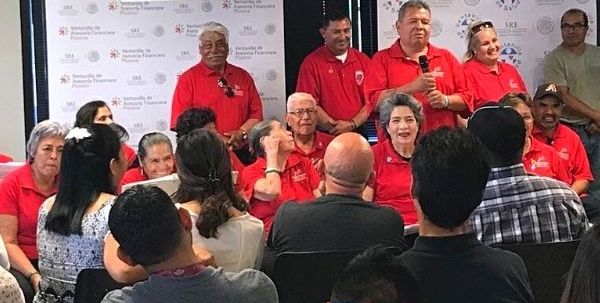
With this awareness in mind, he visited the Guatemalan Consulate in Phoenix to let them know about the services offered by the Muhammad Ali Parkinson Center. “And since this meeting he helped organize, they’ve been great partners with us,” Dr. Martinez says.
Jorge’s success led the group to reach out to the Mexican Consulate, whom they now partner with for annual performances, awareness events, and conversations during Parkinson’s Awareness Month each April.
A Different Song
Many Voces Unidas participants, including Gloria Vazquez and Raul Andrade, say that these community-based events are their favorite part of being in the choir. “They’re something beautiful that I’ve never experienced with any other group,” one member says.
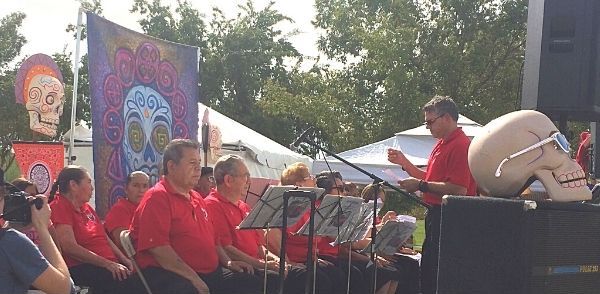
And because they frequently perform and share stories about Parkinson’s in public, the choir also plays a crucial role in educating their community about symptoms, treatments, advice, and more.
“I tell them that they are crucial partners in our goal of raising awareness about Parkinson’s,. At community festivals and other community events, people are more drawn to listen to the festive music of choir Voces Unidas than to listen to a lecture about Parkinson’s. While the audience is listening and enjoying the show, the choir members become empowered enough to take the mic and tell their Parkinson’s stories. It is a way to meet people where they are and help teach them about Parkinson’s, which they may have never heard about.”
–Dr. Martinez
The songs themselves are also awareness tools, especially their well-known “Soy El Compás de Otra Canción”/”I Am the Beat of a Different Song.”
“‘Soy El Compás de Otra Canción’ is about Parkinson’s symptoms and challenges, but it also highlights the hopeful part of Parkinson’s. It inspires you to stay active, to improve your quality of life.”
The song, written by José María Lobo from Mexico, and a companion video created by the Voces Unidas choir was one of the top 12 videos for the World Parkinson Congress in 2016. That year in Phoenix, local TV channels and radio stations interviewed choir members. They treasured that experience and valued their role as partners to raise awareness about Parkinson’s in the community.
They also valued their roles in December 2019’s Victory Summit Event in Tucson. “They loved seeing other people enjoying their performance, dancing along with their songs. They loved meeting and hugging Davis Phinney. They loved that people approached them and told them that although they couldn’t understand the Spanish words of the songs, they loved the performance, the energy, and the diversity they brought to the event.”
Looking to the Future
Since 2012, Ariel Cacheiro, a musician from Cuba, has directed Voces Unidas and helped with the choir’s recorded album, Voces del Parkinson. The choir is currently working on a new recording for the holidays, and they hope to submit a song and video for the 2022 World Parkinson Congress.
“The members have ownership of Voces Unidas, and they want it to grow. They want to take it places.”
-Dr. Martinez
Although the COVID pandemic means they’ve had to pause their public performances, the choir is eager to return to perform as soon as it’s safe. For now, they gather virtually every week to sing and connect.
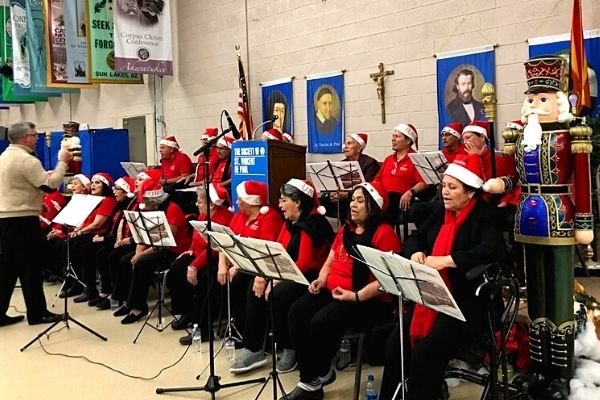
“I found a new family with Voces Unidas,” Juana Flores says, and this shared feeling keeps the participants engaged even from afar.
Setting an Example
“Voces Unidas is not just for the participants—it’s for the community,” Dr. Martinez says. “Being out in the community has shown us that people with Parkinson’s have something valuable to give, and that the community receives it in a very positive way. Finding avenues for them to stay engaged in their own communities is part of the purpose of the choir, and the members embrace that.”
To people interested in creating a community-centered Parkinson’s program like Voces Unidas, Dr. Martinez suggests you explore the make of your community. She encourages people to network and reach out to organizations already working in that community, even if they’re not health organizations. See who you can partner with and what needs you can fill.
Then, let them run with it. Dr. Martinez says, “Many times we care so much and our intentions are in the right place, but many of us are trained to be providers. We need to rethink this. Get to know the people and listen to what they need and want. Let THEIR voices be heard.”


